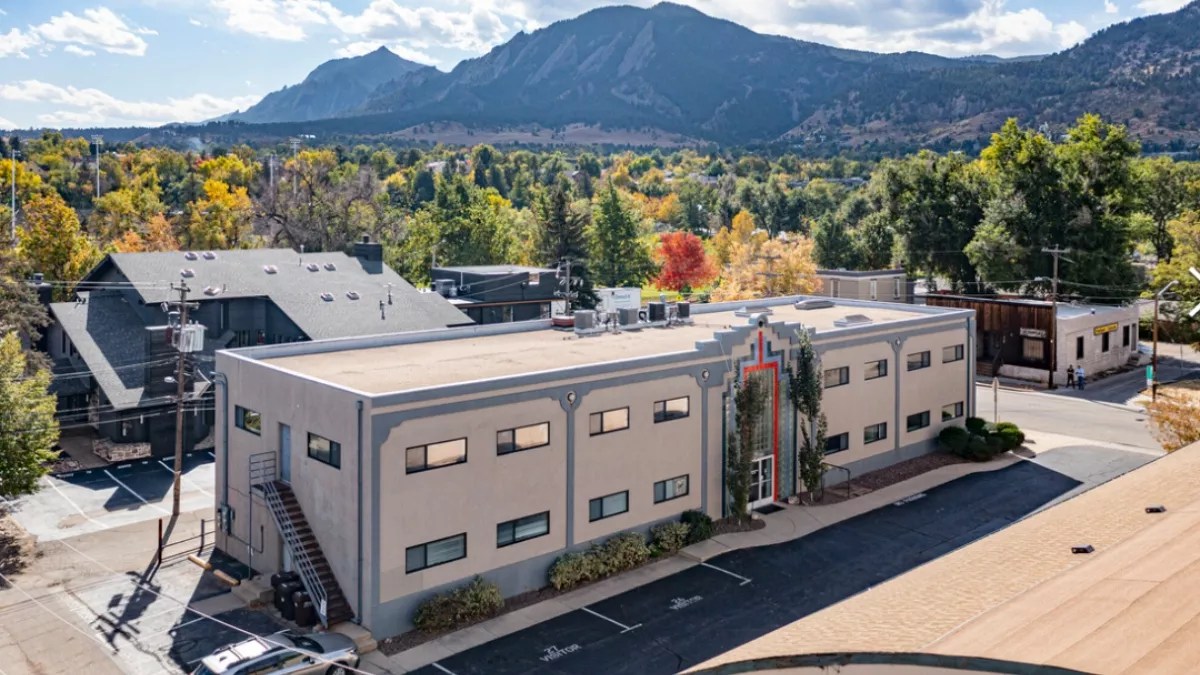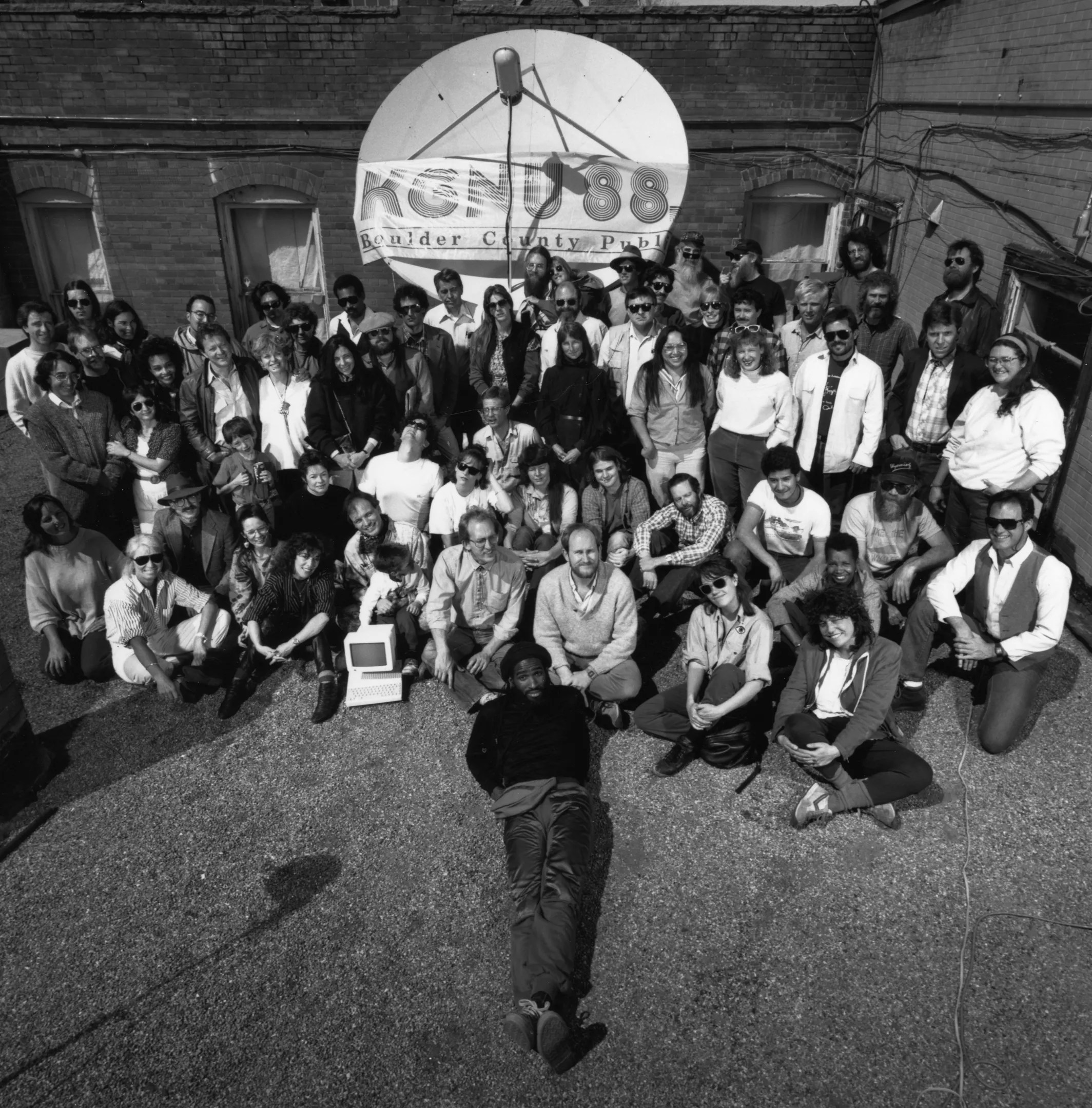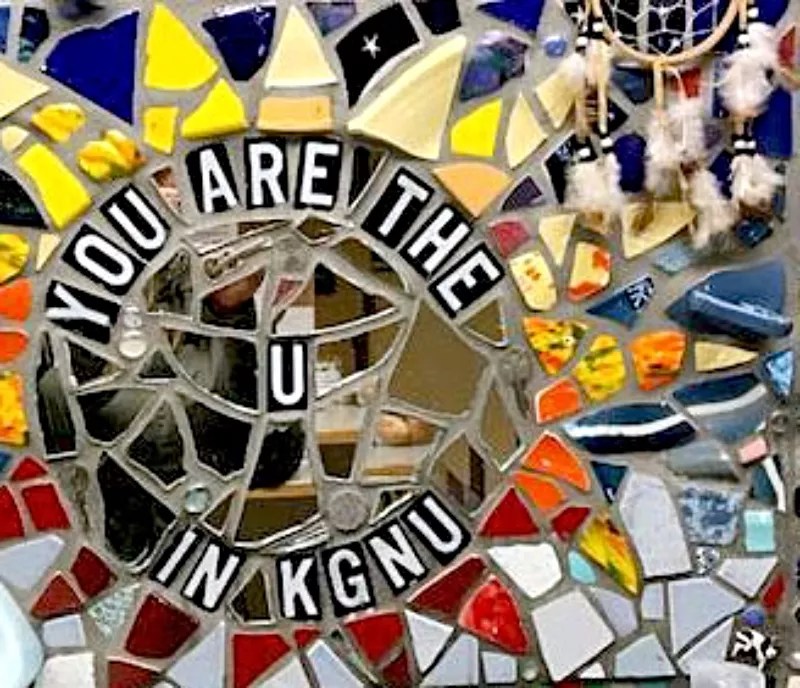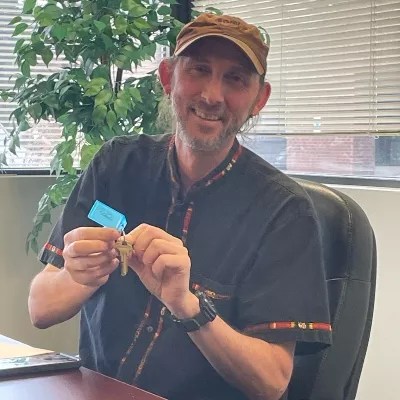
Courtesy of KGNU

Audio By Carbonatix
KGNU Community Radio is one of the most unlikely success stories in Colorado media.
From the beginning, the odds were stacked against the Boulder-based station, which began life as a school project – really. But rather than becoming history, KGNU keeps making it, as evidenced by the just-announced purchase of a sprawling new headquarters weeks before the operation’s 45th anniversary.
Tim Russo, KGNU’s manager, sees the $3.3 million acquisition of the 10,098-square-foot property, located at 1720 14th Street, a short distance from Boulder High School, as symbolic of the outlet’s journey to date.
“This new space really represents the 45 years that have come before,” Russo says. “We’re building from our original founding concepts and ideas and everything that’s happened along the way, so that we can best reflect the communities we serve and how those communities are changing.”
Evolution has been a key to KGNU’s survival, with its initial Boulder signal, at 88.5 FM, currently supplemented by dial positions in Denver (1390 AM), Fort Collins (98.7 FM) and Nederland (93.7 FM). But the core elements of KGNU remain much the same as they were on May 22, 1978, when the station first hit the airwaves.
For one thing, the format is still focused on public affairs, progressive thought and music of every conceivable description largely shared by volunteers – a supposedly antiquated model that continues to work for KGNU. “Volunteers are the pulse of the station,” stresses Russo, who oversees roughly 200 people who regularly donate their time along with a like number who lend a hand during specific events, as well as eight full-time employees, four part-timers and a sprinkling of interns. “They always have been, because that’s the participatory nature of KGNU.”

This 1981 KGNU staff photo was taken shortly after the station moved to a space above the Aristocrat Restaurant near the intersection of Broadway and Spruce.
Courtesy of KGNU
According to Russo, some members of KGNU’s first batch of volunteers are still pouring their passion into the station, while many others have been shouldering part of the load for decades. But he’s more modest when it comes to detailing the background of another onetime volunteer: himself. He signed up in the early 1990s, when he was attending the University of Colorado Boulder, because he saw KGNU as being in tune with his work as a student activist. He subsequently spent twenty years working as a journalist in southern Mexico and Latin America, where he also “helped to launch a network of some twenty-odd community stations and media centers” across the region, he says. But in 2015, he was lured back to Boulder to manage KGNU; he says that he saw the gig as “an opportunity to help support a station that had been supportive to me.”
An additional attraction for Russo: In an era of increasing community-radio corporatization, as exemplified by the blockbuster 2020 deal that brought Colorado Springs’s KRCC under the Colorado Public Radio umbrella, KGNU remains proudly independent and deeply devoted to helping other stations with similar goals. Note its membership in COLab, the Colorado News Collaborative, and the significant role it plays in both Rocky Mountain Community Radio, a coalition of non-commercial radio stations in Colorado, New Mexico, Utah and Wyoming, and the National Federation of Community Broadcasters, whose 2023 annual conference is scheduled to take place in Denver from June 28 to June 30.
Such institutions contain “the essence of KGNU,” Russo says. “We’ve sustained ourselves by building mutual-aid networks with stations that aren’t part of a conglomerate or consolidated entity. But it’s also very important for us to be community-centered. We think local media is important, and that it should be in the hands of the communities it serves.”
“The Little Station That Could,” published by Westword in March 2001, documents the roots of this philosophy by way of a conversation with Marty Durlin, one of Russo’s predecessors as KGNU manager. From 1972 to 1975, Durlin worked at KCFR, the anchor station of Colorado Public Radio, during what she referred to as “the old freeform days.” A few years later, in 1978, another of her KCFR colleagues, John Stark, was involved in launching KGNU, which sprang from a class at the Boulder Free School called “A Desperate Attempt to Start a Radio Station, Part II.” (“The first part obviously hadn’t gone too well,” Durlin pointed out.) With Stark as program director and Glen Gerberg (a future Channel 2 weather forecaster) ensconced as station manager, KGNU set up housekeeping in a portion of Boulder’s Harvest House that consisted of three rooms and a closet. “The production room was the closet,” Durlin explained.

According to station manager Tim Russo, “The mosaic is an art piece that was built into the 4700 Walnut Street building after it was purchased in 2000.”
Courtesy of KGNU
Despite the modesty of these digs, KGNU soon established a foothold with Boulder radio listeners, and its slow but steady growth necessitated a series of moves over the decades that followed. “After what we call ‘the shack behind the Harvest House,’ we moved downtown just off Broadway and Spruce above the Aristocrat, which was a restaurant in Boulder for a long time,” Russo says. “Then we moved to Walnut and Folsom, next to Mike’s Camera and the Boulder Daily Camera,” before settling down the road at its current location, 4700 Walnut Street. There, the station benefited from a sizable bump in resources. In 2015, Russo estimates, KGNU’s operational budget was around $700,000 per year, not including projects funded by grants; today, it’s a little over $1 million.
Fortunately, the chance for another location upgrade came along in 2017, when “the City of Boulder opened up a process and created a stakeholders’ committee to begin to look at how they could extend a sales tax that would help fund capital improvement projects that would enhance community, culture and safety,” he recalls. “It wasn’t a new tax, but a renewal of a tax that had previously funded places like the Dairy Center and the Museum of Boulder.”
The concept turned into a plan that would allow a number of Boulder nonprofits to receive matching grants, and after the proposal was passed by the Boulder City Council and overwhelmingly approved by voters, KGNU became eligible for $1.25 million…if the station could raise a like amount.
The campaign got underway in early 2018, but progress was slow, in large part because of the rise of COVID-19, when “our priorities pivoted to being able to sustain and implement new systems, keep all of our staff employed and continue to function during the pandemic,” Russo explains. “We came through that well: We didn’t have to furlough or lay anybody off, and we actually expanded our staff. But it was a difficult time for obvious reasons, and capital fundraising for bricks and mortar were lower priorities.”

KGNU station manager Tim Russo holding the key to the new property.
Courtesy of KGNU
The money mountain got even higher after KGNU’s board determined that buying a new building would be a better option than overhauling the 4700 Walnut space. “We recognized early on that renovating our current facility would mean significant interruptions at the time of construction and a large outlay for temporary studios, because we have a 24/7 operation to manage,” Russo says.
The 1720 14th Street structure provided a solution to these problems. Russo describes its owners as three local environmental lawyers who are also fans of KGNU. Moreover, the only current tenant is a commercial architectural firm that’s occupying only about 25 percent of the available space. The company will be able to stick around until ground is broken on a remodel that will feature cutting-edge broadcast and production studios, a section devoted to live performances, a community room and a cafe.
The $3.3 million cost of the building should be covered by the combination of cash raised by KGNU and the City of Boulder’s matching funds, as well as the proceeds from the sale of the 4700 Walnut building. But Russo calculates that another $1.5 to $2 million will be needed to complete the work. He’s optimistic that this amount can be generated over the next eighteen months to two years, allowing a shift to the new space by early 2025.
To Russo, the acquisition of the building so close to KGNU’s 45th anniversary “is very appropriate for us, and in many ways, it brings us full circle. We feel a responsibility to make sure we can help sustain our community’s cultural vibrancy, especially at a time in Denver and Boulder where cultural organizations are being priced out. We want to be a cultural anchor where creatives can really thrive. And with media literacy so challenged by misinformation from some of the platforms many folks gravitate to, we want to make sure to disseminate the type of media that you can’t readily find elsewhere in the community – or on the dial.”